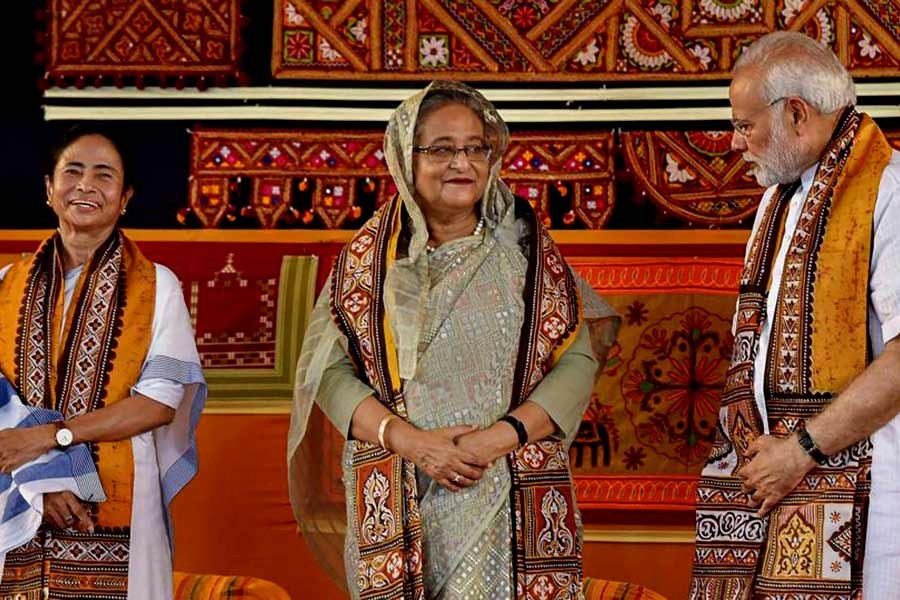The meetings of Prime Minister Sheikh Hasina with the Indian Prime Minister Narendra Modi and Paschimbanga Chief Minister Mamata Banerjee took place while she was on a two-day official visit to India on May 25-26. The three leaders joined two ceremonies - the 49th convocation of Visva-Bharati University and the formal inauguration of the 'Bangladesh Bhaban' sponsored by Bangladesh Government on the university campus.
Prime Minister (PM) Hasina and her 80-member entourage, including three cabinet ministers and four advisers, were warmly welcomed by PM Modi on May 25 at Shantiniketan of Paschimbanga, about 160 km from Kolkata. Hasina is the first head of government of a foreign country to be present at the convocation of the Visva-Bharati University.
The inauguration of Bangladesh Bhaban jointly by Hasina and Modi was symbolic of the deep cultural ties between the two countries. With a floor area of 9,000 square feet, it houses a museum that exhibits Rabindranath Tagore's associations in Bangladesh, the Liberation War of 1971, Bangladesh-India relations, a library and a large seminar hall. It is hoped that the inauguration of the Bangladesh Bhaban will contribute towards deepening of cultural relations between the two countries.
After inauguration of the 'Bangladesh Bhaban', PM Modi and PM Hasina met for about half-an-hour and discussed wide-ranging bilateral issues including those related to security and political concerns in the region.
At the convocation of Visva-Bharati University, PM Modi who is Chancellor of the University, emphasised in his speech that "India and Bangladesh are separate countries but bonded by cooperation and understanding."
Underscoring the significance of "mutual cooperation", Modi asserted in his speech that both countries "can learn from each other in areas of public policy and culture." He also observed: "The progress made by Bangladesh in the area of social sector, particularly in improving the lives of the people, is something we can take inspiration from."
In her convocation address, PM Hasina, as a special invitee, said: "We have sorted out many bilateral issues. There are still some pending ones but I don't want to spoil the beautiful occasion by referring to them. We want to settle all issues in a friendly ambience."
Her statement seems to implicitly refer to the longstanding Teesta dispute. Bangladesh has been demanding equitable share of the Teesta River-waters which flowed into it through West Bengal from Sikkim, Bhutan.
Diplomatic Consultations and dialogues on the sharing of the Teesta waters have continued since 1983 without any tangible result. A 2011 interim deal on the sharing of Teesta River waters was negotiated by New Delhi and Dhaka for a period of 15 years. The accord provided 37.5 per cent of Teesta waters to Bangladesh and 42.5 per cent to India.
But it was not concluded due to Mamata Banerjee's opposition. She even refused to accompany the then Indian PM Manmohan Singh to Dhaka for signing the accord. Since water is a state subject in India, approval of the Paschimbanga government was a prerequisite for signing any deal.
However, PM Hasina recalled the signing of historic protocol of the Land Boundary Agreement in 2011. The deal resolved the protracted un-demarcated land boundary of about 6.1 km, as well as the exchange of enclaves and adverse possessions by the two countries "amicably".
PM Hasina sought "cooperation from all to put pressure" on the oppressive Myanmar government to take back over one million Rohingya refugees sheltered in make-shift camps in Bangladesh. She obviously called for a tougher Myanmar strategy from India.
But Bangladesh's closest ally and strategic partner India did not respond positively to that request. Thus, the question remains: Will India ignore its overriding economic interests, geopolitical goals and security interests in resource-rich Myanmar, where it has invested heavily, for the sake of ameliorating the difficulties Bangladesh is currently facing?
Indian PM Modi and Chief Minister Mamata in their speeches avoided commenting on Bangladesh's formidable problem of sheltering the Rohingya refugees.
Prior to her departure for Dhaka, PM Hasina had an hour-long closed-door meeting with the Chief Minister Mamata Banerjee at a hotel in Kolkata. Indian newspapers described the two leaders' meeting as a "courtesy" encounter.
CM Mamata said: "We discussed about cultural, educational and business exchanges between the two Bengals…" She gave no indication that the longstanding Teesta water-sharing dispute was discussed in the meeting.
However, Mamata revealed that her government was keen to build a museum to honour Bangabandhu.
Thus the visit of PM Hasina has apparently contributed towards reinvigorating and strengthening cultural bonds between the two fraternal countries. But the people of Bangladesh expected tangible actions from India for the resolution of the crucial Teesta water-sharing dispute and the Rohingya refugee problem.
Dr. Kamal Uddin Ahmed is a former Professor and Chairman, Department of Political Science, University of Dhaka. He is author of the book, Bangladesh and its Neighbours, (Asiatic Society of Bangladesh, 2008).


